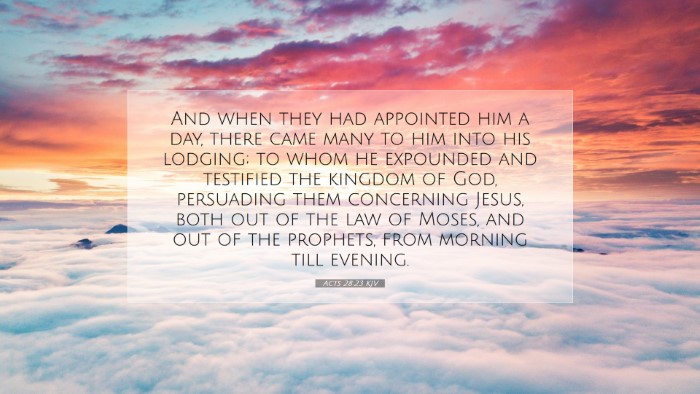Acts 28:23 Commentary
Acts 28:23 denotes a pivotal moment in the apostolic ministry, illustrating the Apostle Paul's enduring commitment to the proclamation of the gospel even under house arrest in Rome. This commentary incorporates insights from renowned theologians like Matthew Henry, Albert Barnes, and Adam Clarke, providing a holistic view of this scripture and its implications for the early church and contemporary believers.
Contextual Background
In Acts 28, the Apostle Paul has arrived in Rome after a tumultuous journey marked by shipwreck, divine intervention, and unwavering faith. He was allowed to dwell by himself in a rented house, guarded by a soldier, showcasing the Roman system's paradox—freedom within confinement. The context underscores the tension between the burgeoning Christian movement and the established religious and political authorities.
Verse Analysis
Acts 28:23 states:
“And when they had appointed him a day, there came many to him into his lodging; to whom he expounded and testified the kingdom of God, persuading them concerning Jesus, both out of the law of Moses, and out of the prophets, from morning till evening.” (Acts 28:23, KJV)
Invitation to Dialog
Matthew Henry emphasizes the significance of Paul's invitation to dialogue. This act of gathering the Jews demonstrates his pastoral heart and zeal for evangelism. Paul did not shy away from confrontation; rather, he sought opportunities to share the gospel message. Henry notes, "In the midst of his chains, he showed no less fervor in preaching than when he was at liberty." This reflects the commitment required of leaders in ministry.
Expounding the Kingdom of God
Paul's methodology was multi-faceted, as highlighted by Albert Barnes. He "expounded and testified the kingdom of God," indicating a thorough interpretation of the Scriptures. Paul's approach was not only apologetic but also explanatory, showing the fulfillment of Old Testament prophecies in Jesus Christ. This reinforces the interconnectedness of the Biblical narrative and the importance of understanding the Scriptures as a cohesive whole.
The Law and the Prophets
Adam Clarke notes that Paul's reference to "the law of Moses and the prophets" signifies his unyielding respect for Hebrew Scriptures. Clarke elaborates that by pulling from these sources, Paul was not merely advocating for a new religion but was demonstrating Christianity's roots in Judaism. This connection served as a bridge to engage his audience effectively and convincingly. Paul's example serves as a model for contemporary evangelism where understanding cultural and religious contexts is imperative.
The Persistence of the Gospel
The extent of Paul's efforts—"from morning till evening"—illustrates not only his passion but also the urgency of his message. Henry remarks that such commitment reflects the Apostolic model of ministry, one that is relentless in reaching souls for Christ despite obstacles. The time spent speaks to a significant investment in the lives of those gathered, a notable principle for pastors and students of the Word today.
Theological Implications
Theological themes arise from this passage, such as:
- The Kingdom of God: Understanding this concept is central to both Old and New Testament teachings. Paul’s effort to articulate the kingdom intertwines theological significance with practical teaching.
- Jew-Gentile Relations: The verse encapsulates the ongoing challenge and invitation to Jewish leaders to recognize Jesus as the Messiah, which carries implications for modern interfaith dialogues.
- Scriptural Authority: Paul's validation of both the Law and the Prophets affirms the unbroken thread of Biblical revelation, emphasizing the importance of Scripture in ministry.
Conclusion
Acts 28:23 is a profound testament to the apostolic mission, characterized by zeal, scholarly argumentation, and an unwavering commitment to Christ. The insights offered by Matthew Henry, Albert Barnes, and Adam Clarke collectively reinforce the richness of this verse. For pastors, students, theologians, and scholars alike, this passage serves not only as a historical account but as an enduring call to faithfully proclaim the gospel through diligent study and passionate witness.


